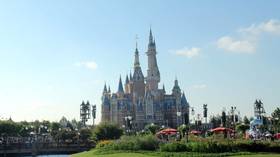China getting back to business as worst of coronavirus outbreak in country appears to be over
The Chinese economy is slowly recovering from the Covid-19 epidemic, with production facilities, stores and leisure complexes resuming operations after weeks-long closures.
The coronavirus outbreak could have already “passed its worst,” the regional chief investment officer of UBS Global Wealth Management said as the number of new infections is declining in the country, but surges everywhere beyond it. Thus the Chinese economy may become “the first in the world” to get back to normal, the bank's official believes.
Earlier this week, Chinese President Xi Jinping visited Wuhan, the epicenter of the outbreak. Shortly after the visit, local authorities started lifting restrictions on some of the industries, as well as on the movement of people and goods.
Car & tech industries
Wuhan as well as nearby cities in Hebei province are China's industrial hubs that host multiple plants of international auto giants and hundreds of parts suppliers. It was earlier reported that the quarantine-related closure has cost each company nearly $6 million per day.
On Wednesday, Japanese automaker Honda announced that it had resumed some operations at its facility in Wuhan, promising to gradually resume vehicle production. Meanwhile Nissan revealed to Reuters its plans to partially resume production at two Chinese plants, one of them in ill-fated Hubei.
Last month, General Motors, Fiat Chrysler and Toyota announced the reopening of their factories and resumption of production in China. Other auto majors, such as Groupe PSA that includes car brands, Peugeot, Citroen, DS, Opel and Vauxhall, is reportedly planning to relaunch production in Hebei on March 20, while Renault Dongfeng may resume operations in Wuhan starting next week.
The shutting down of factories across China has threatened to disrupt global supply chains, including in the tech industry, as many suppliers are located in the country. For example, Apple’s main iPhone maker Foxconn, had to cut production over fears of the fast-spreading disease. Last week the company vowed to resume normal production by the end of March as half of its seasonal workers were allowed to come back to work.
China's tourism industry takes cautious steps
Shanghai Disneyland, which has been closed since January 25 due to the outbreak, partially resumed operations on Monday. The resort reopened shopping, dining and recreational establishments on its territory, but it is not clear when the park will be fully operational. However, another Disney resort in Hong Kong is still closed.

Tourist attractions are starting to reopen their doors in Shanghai. China's iconic Shanghai Tower as well as the Shanghai Oriental Pearl Tower and the Shanghai Jinmao Tower are set to open for tourists on Thursday. Visitor numbers will be kept under half of capacity, with all people entering the buildings recommended to wear facial masks and take body temperatures.
Retailers wait for clients to come back
International retailers tried to offset their losses from the coronavirus outbreak through online sales, but now they are slowly getting back to business. After closing all its Apple stores in China in February, the iPhone maker has already reopened 90 percent of its 42 retail locations, the China Daily reported on Monday. Only four stores remain closed.
Over the last two weeks the world's biggest furniture brand, IKEA, reopened nearly half of its 30 stores in the country. At the same time, Tokyo-headquartered Muji and French department store Galeries Lafayette have reportedly resumed operations.
For more stories on economy & finance visit RT's business section












